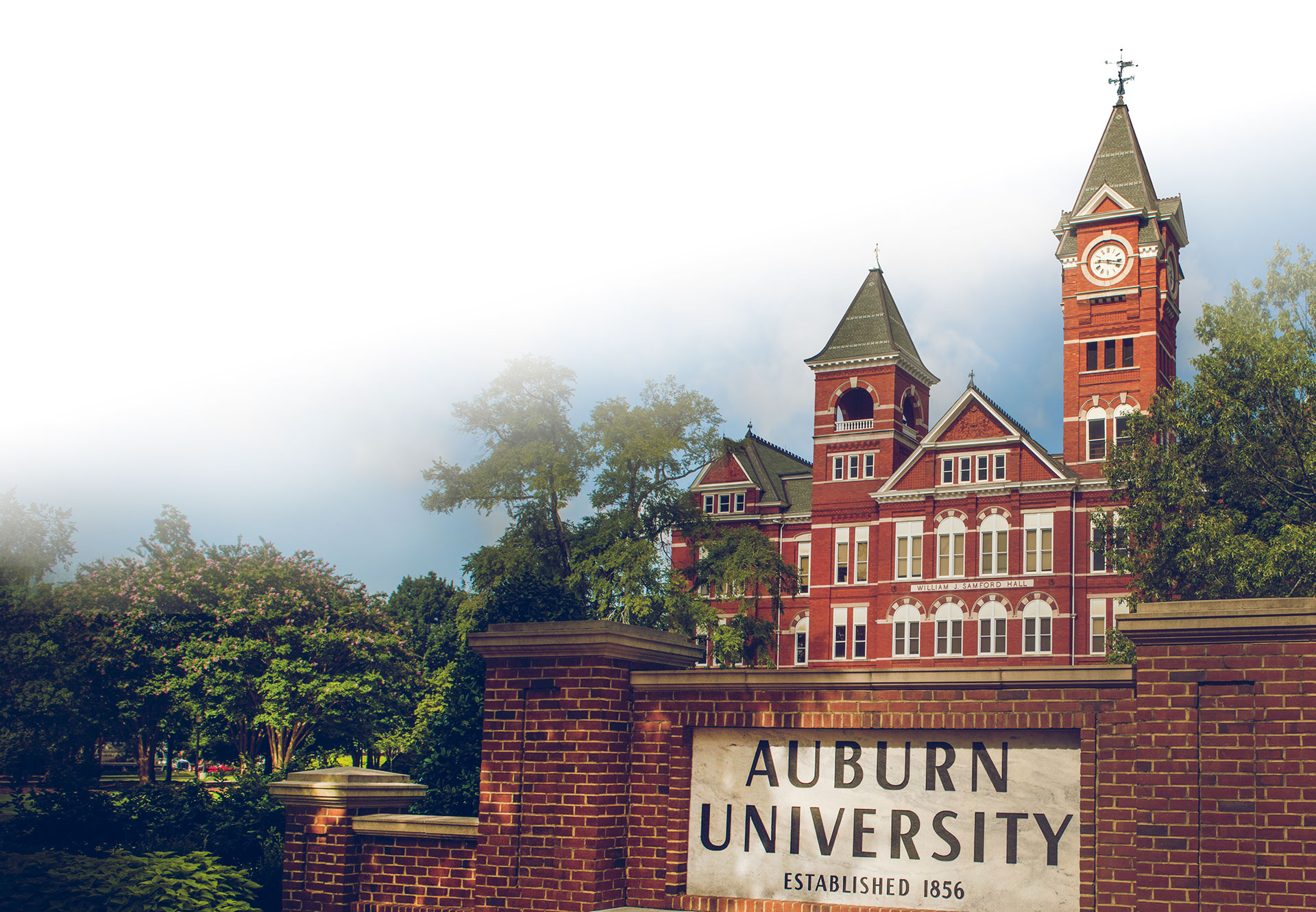Dean Giordano Shares Virtual Update with COSAM's Leadership Council Members
Learn MoreMISSION STATEMENT
The mission of the College of Sciences and Mathematics (COSAM) is to provide foundational support for all aspects of the land-grant mission of Auburn University through (1) impactful courses and curricula, (2) forefront research that advances the mathematical, physical, and life sciences, and (3) outreach and service programs that improve the lives of citizens of Alabama, the nation, and the world.
VISION STATEMENT
COSAM will achieve this mission through programs that are recognized for their excellence and admired for their innovative design and spirit.
PREAMBLE
This strategic plan is organized around the six strategic goals of the Auburn University Strategic Plan 2019-2024: Leading and Shaping the Future of Higher Education:
- 1 Elevated Auburn Experience for Our Students
- 2 Transformative Research
- 3 Impactful Service
- 4 Exceptional and Engaged Faculty and Staff
- 5 Strategic Enrollment
- 6 Operational Excellence
- 7 Telling the COSAM Story
INCLUSION, EQUITY AND DIVERSITY STATEMENT
COSAM is committed to cultivating culturally competent professionals. COSAM’s Office of Inclusion, Equity and Diversity provides resources to enhance awareness and appreciation of cultural and individual diversity, promote community, and prepare students to have a global impact in STEM.
COSAM DEPARTMENTS
COSAM includes five departments:
• Biological Sciences
• Chemistry and Biochemistry
• Geosciences
• Mathematics and Statistics
• Physics
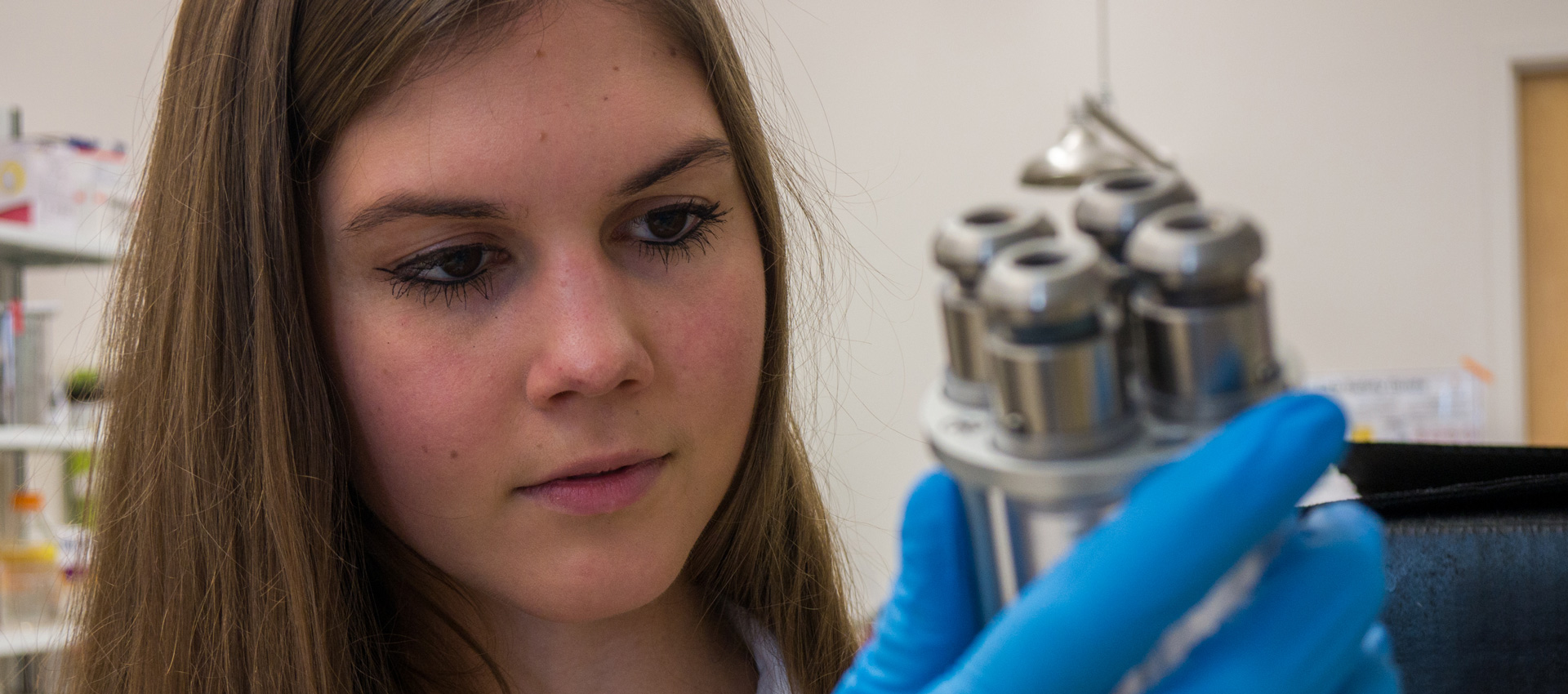
GOAL 1: ELEVATED AUBURN EXPERIENCE
COSAM is essential to the educational mission of Auburn University through the teaching of core and foundational science and mathematics courses. The college will continue to innovate and improve these courses. At the same time, we will continue to provide COSAM majors with curricula that are tailored to their needs. Currently a majority of COSAM majors are in pre-health curricula, however, a significant number are also in programs with the goal of continuing their education in graduate schools or entering the workforce. There are numerous opportunities for the college to develop new majors and minors, to grow the number of pre-health majors, adopt curricular innovations, enhance retention, and increase both four and six year graduation rates, all with the goal of increasing the value of an Auburn University degree.
Below are priorities in connection with the Elevated Auburn Experience strategic goal. Key KPIs are indicated on the left side of the page. Two important KPIs are the success rates in COSAM courses and majors and minors, and graduation and retention rates.
PRIORITY INITIATIVES
-
Curricular innovation through the development of new majors, minors and streamlined curricula. Re-evaluate existing curricula. Update and streamline curricula to increase flexibility with fewer required courses and more electives. Develop new courses as necessary.
-
Increase enrollment in degree programs that have excess capacity.
-
Explore the need for accelerated BA-MA or BS-MS degree programs in more COSAM majors (currently only in Department of Geosciences and Department of Physics). This will provide more students with advanced degrees for enhanced employment opportunities or as a springboard for additional graduate and professional school work.
-
Develop new certificates. Plan to create one new certificate every two years.
-
Expand and improve online course offerings and study success rates in these courses to improve their efficacy. Where possible integrate elements from online courses with on-campus versions to strengthen both types of courses.
-
Continue to develop Auburn First Initiative as a recruitment tool for high-performing high school students, and to ensure that student learning in those courses enables student success in higher-level courses.
-
Continue to monitor success rates in foundational courses and explore ways to improve student learning in these courses.
-
Continue to develop active learning approaches that integrate high impact practices such as project-based and team-based learning, and ePortfolios when appropriate for course area and content.
-
Continue to build the DBER cohort. DBER members are catalysts for instructional improvement and innovations, and through their research and classroom activities can mentor other faculty and graduate students in their specific disciplines.
-
Improve instructional training of new faculty and graduate students. Enhanced graduate student training as part of their professional development will improve their competitiveness for careers with teaching responsibilities. Increase collaborations with Biggio Center, an important campus resource for enhancement of teaching and learning. These collaborations can address elements in all the categories in this section.
-
Enhance student success through innovative advising programs and for transfer students in their first courses at Auburn University.
-
Monitor the freshman to sophomore retention rate, transfer student academic warning rate, and DFW rates.
-
Expand the number of research opportunities and other outside-the-classroom development opportunities for undergraduates.
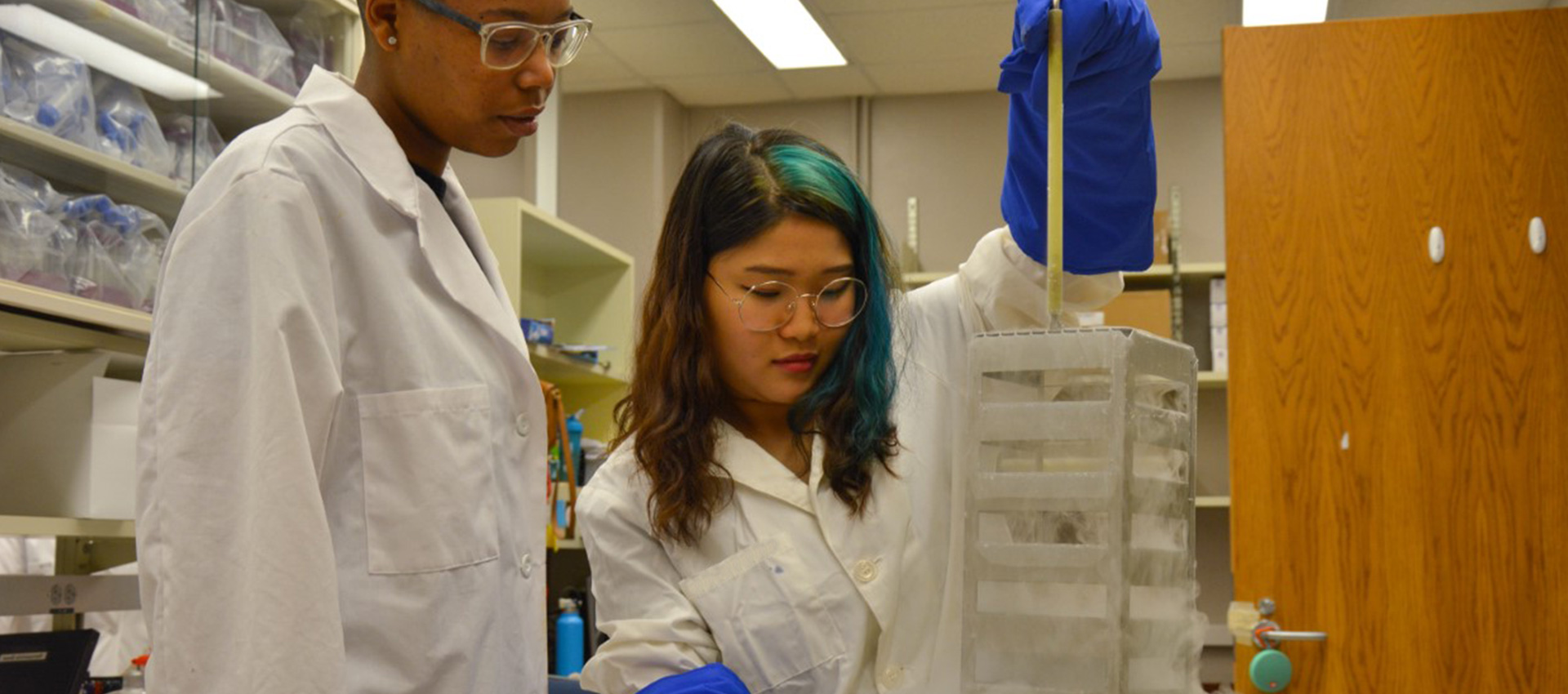
GOAL 2: TRANSFORMATIVE RESEARCH
Faculty in COSAM are actively engaged in diverse laboratory, theoretical, computational and field research. These endeavors range from fundamental research to real-world applications. The substantial growth of new faculty over the last five years has led to the development of new multi-disciplinary research directions (e.g. biophysics, energy, DBER and omics). Expansions in translational activities have also occurred, where intellectual property from academic research has been converted into commercial products and has resulted in the formation of several start-up companies. One important measure of the growth of research in COSAM is the increase in the federal research portfolios, where the college observed an approximate doubling in extramural funding over the period FY2014 – FY2019. Based upon these past successes and through strategic planning, COSAM will continue to nurture a culture of transformative research over the next five years, one that supports our current endeavors while also leading to the creation of new scientific paradigms.
The COSAM priority areas and initiatives for research will fully embrace Auburn University’s strategic goal of Transformative Research: Elevate research and scholarly impact to address society’s critical issues and promote economic development in Alabama and beyond. Within this goal, Auburn University has identified six areas as essential to elevating our scholarly and research impact:
- Faculty and Research-Engaged Students
- Culture
- Process and Capabilities
- Infrastructure
- Focus
PRIORITY INITIATIVES
- Attract faculty, staff and graduate students who can continue to grow the COSAM research enterprise.
-
Hire top mid-career and senior faculty to enhance the research program in selected areas.
-
Continue to recruit strong junior faculty in all departments.
-
Provide the appropriate infrastructure (e.g., administrative support, research facilities, laboratory space, IT support, etc.) to allow faculty and graduate students to successfully engage in research.
-
- Build on a climate that respects and values all of the contributors to the research enterprise: faculty, research staff, post-docs and students.
-
Implement new programs to improve graduate student mentoring and success.
-
Develop college-wide professional development and mentoring programs for post-docs.
-
Develop strategies that can provide stable support and professional development for research staff.
-
Promote a culture of performing transformative research by encouraging the development of new research directions, supporting new research approaches (e.g. multi-PI collaborations, interdisciplinary teams, etc.).
-
- Assist COSAM faculty during the complete life-cycle of proposals, grants, and other funding mechanisms.
-
Continue to improve pre-award proposal support activities to help reduce administrative burden and reduce barriers to proposal submission.
-
Expand support for post-award activities.
-
Establish college-level support for intellectual property protection.
-
- Create new opportunities for faculty to establish and grow successful and transformative research programs.
-
Continue to provide opportunities for individual researchers to be successful within their academic disciplines.
-
Develop mechanisms to promote inter- and cross-disciplinary research discussions, collaborations, and proposal submissions.
-
Develop strategies and expertise needed to attract COSAM-based, center-level research activities.
-
Support activities that translate academic research into entrepreneurial activities.
-
Support and promote the development of innovative and novel research.
-
- Develop the intellectual and physical infrastructure that can lead to significant growth of the COSAM research portfolio.
-
Work to make new research space available including, e.g., upgraded or new buildings that include modern, high-quality spaces for experimental, theoretical, and computational research activities.
-
Develop new funding models that ensure the viability of shared laboratory facilities and equipment including maintenance, long-term service contracts and timely replacement.
-
Improve COSAM support for research computing and data storage.
-
While each of these tactical goals is an important activity for COSAM, they are not to be taken as isolated activities. It is only through the integration of these goals that we can be successful.
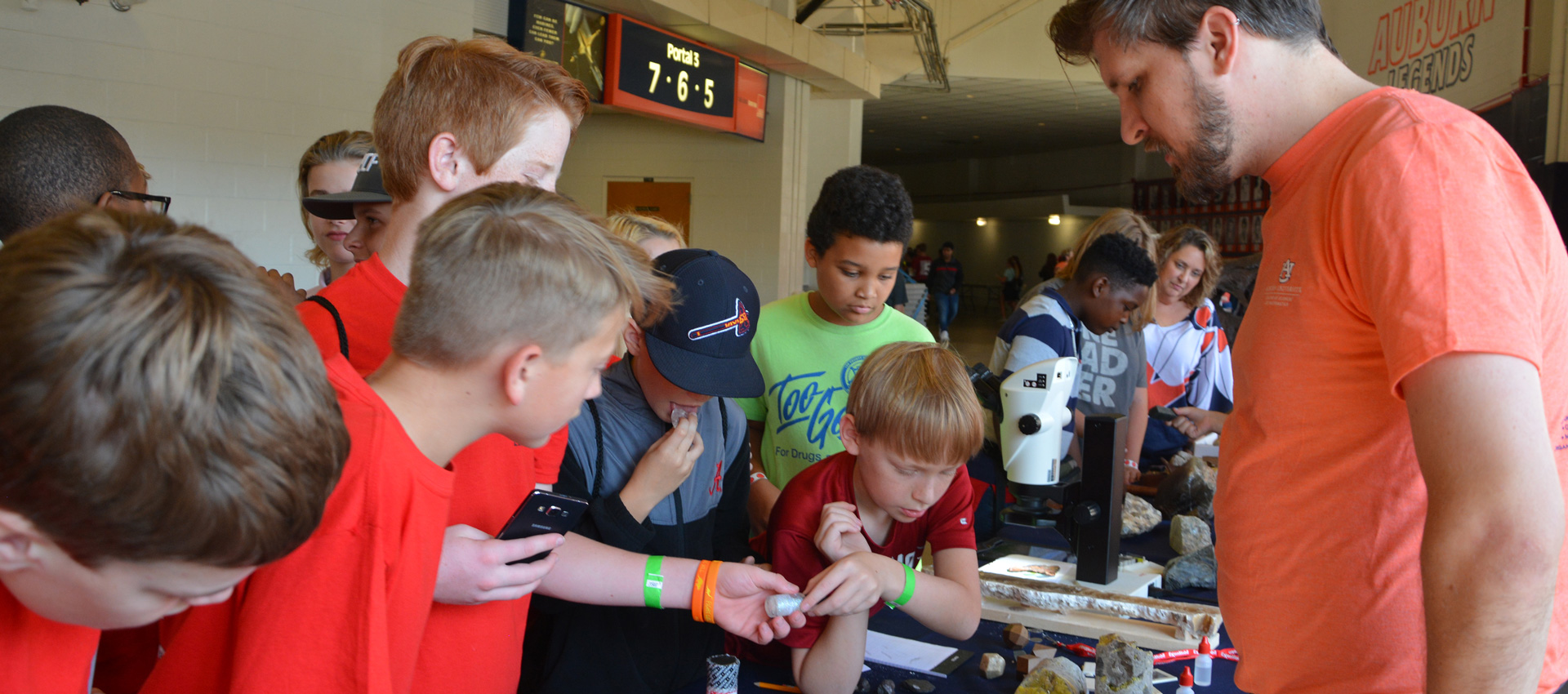
GOAL 3: IMPACTFUL SERVICE
COSAM plays a key role in the land-grant mission of Auburn University through its service to the public in Alabama and beyond. This service is exemplified by (1) being a first resource in providing exceptional scientific and mathematical expertise to the public through consulting and technology transfer, (2) expanding Auburn University’s educational reach through robust science and mathematics programs in support of K-12 education, and (3) enhancing economic development through workforce development in outreach, hosting national and international meetings and engaging with the private sector in business development. Well aligned with the University Strategic Plan, these service objectives fall naturally within the purview of COSAM.
First Resource
The fundamental scientific expertise of our faculty and staff is a critical resource to the state of Alabama and the nation in a wide variety of areas. These areas include statistical and numerical analysis, fusion energy development, rugged and energy-efficient electronics materials, environmental and natural hazards, cultural and socioeconomic issues in human geography, conservation and ecology, human health and physiology including cancer and viruses, biological mechanisms in fuel development, and many more. While not comprehensive, this list provides some insight into the breadth of practical expertise within COSAM. This is further demonstrated as faculty within the college serve on prestigious national and international advisory boards and panels, a reflection of their expertise that enhances the profile of Auburn University.
Economic Impact
The economic impact of COSAM comes on multiple fronts, including workforce development through outreach, hosting international workshops and conferences, and through technology transfer to the private sector and development of businesses based on new science.
-
Workforce Development: The Southeastern Center of Robotics Education is a newly created initiative that is designed to prepare future generations of STEM professionals by developing and delivering student robotics programs, online robotics resources, and professional development for teachers. Over the past two years, the center facilitated the start of approximately 400 new student robotics teams throughout the state. Students learn design skills, team building, and the implementation of STEM concepts as they develop robots for competitions at the local, state and national level. Supported primarily through extramural foundation grants, the center already impacts approximately 2,000 students annually in the development of these critical workforce skills.
-
International Workshops and Conferences: Departments within the college regularly host national and international scientific meetings, and host visiting scholars. In addition to raising the profile of Auburn University, these meetings impact on the local economy at the million-dollar level annually.
-
Technology Transfer: Experts throughout the college procure patents associated with their research and create new technologies that are transferred to private sector. The development of businesses based on new science creates local jobs, infuses capital into the economy and enhances Auburn University reputation throughout Alabama and beyond.
PRIORITY INITIATIVES
-
Grow the number of students impacted annually in K-12 outreach and workforce development efforts.
-
Increase the number of engaged faculty and staff and level of participation in service and outreach activities.
-
Reward membership and service of faculty and staff on state and national advisory boards and panels.
-
Increase the number of national and international workshops and conferences hosted.
-
Increase the number of patents procured and the development of businesses stemming from COSAM expertise.
-
Increase the recognition of COSAM’s extensive outreach and service efforts by communicating its value-addition to Auburn University’s mission and its broad impacts on diversity and inclusion. Increase the number of COSAM stories showcasing outreach.
-
Support public engagement through public lectures and similar activities.
-
Work with other units at Auburn University to develop streamlined infrastructure to facilitate hosting international conferences and workshops.
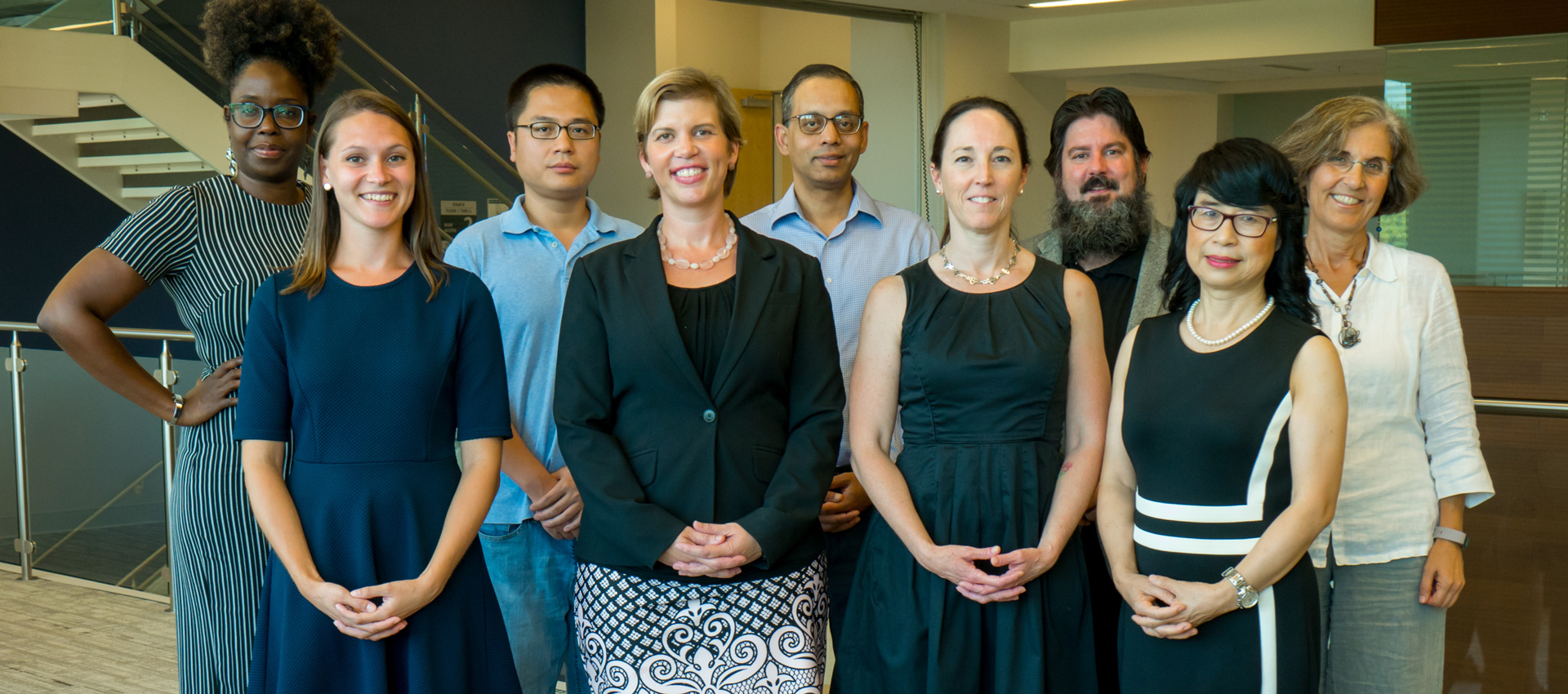
GOAL 4: EXCEPTIONAL AND ENGAGED FACULTY AND STAFF
PRIORITY INITIATIVES
- Attract and retain top faculty and staff.
-
Review all job descriptions in COSAM, particularly staff positions. Update as necessary so that they align with what employees actually do. Where possible, job descriptions and duties should be similar across COSAM departments and offices.
-
Improve compensation packages to attract and retain the best employees. Where possible bring salaries into alignment with SREB data (for faculty) and market rates (for staff). Continue to increase graduate student salaries as college funding allows.
-
Create discipline-dependent hiring processes that allow for increased visibility with potential candidates, with the goal of attracting a more diverse and competitive pool of candidates.
-
For faculty searches, we will develop and adapt flexible hiring plans consistent across COSAM departments that allow strategic hiring decisions to be made in a way that balances long-term strategic hiring with unforeseen opportunities (i.e., two career couples) that often arise.
-
Provide diversity, cultural and implicit bias competency training for search committee chairs and members. Where possible, expand search committees to include members from a variety of disciplines and also graduate students.
-
- Encourage and support professional growth of all employees.
-
Develop a program for full career mentoring for faculty and staff that is consistent across departments and colleges.
-
Develop an onboarding process specific to COSAM for staff and faculty.
-
Expand professional development offerings for staff with college level resources available.
-
Publicize faculty and staff who are recognized as fellows of their respective professional societies.
-
- Create an environment that maximizes teaching, research and service contributions.
-
Assess and improve the annual review process to ensure the evaluation instruments are tied to the job description. Develop a survey for staff to determine if the changes to the evaluation improved the review process to make it mutually beneficial. Compare the faculty annual review processes across all departments. Develop a minimum rubric across COSAM. Incorporate a discussion of professional and career development as part of staff the annual review process.
-
Peer mentoring of faculty and staff. Where possible, arrange for senior faculty and staff to teach professional development classes.
-
Provide opportunities through workshops and trainings for faculty and staff to increase their cultural competency. Reach 20 percent of faculty and staff each year over the next five years.
-
Continue to develop new award programs and simplify the process to reduce barriers for nominations.
-
- Improve workplace culture and atmosphere.
-
Continue to survey faculty and staff to assess workplace climate. Use results to identify and address problem areas.
-
Continue to conduct town hall meetings to improve communication and transfer of information. Evolve the town hall concept over time to maintain fresh approach and engagement.
-
COSAM plans to undertake a number of initiatives to improve employee engagement and development. Several initiatives have recently begun while others will be implemented during the course of the next five years.
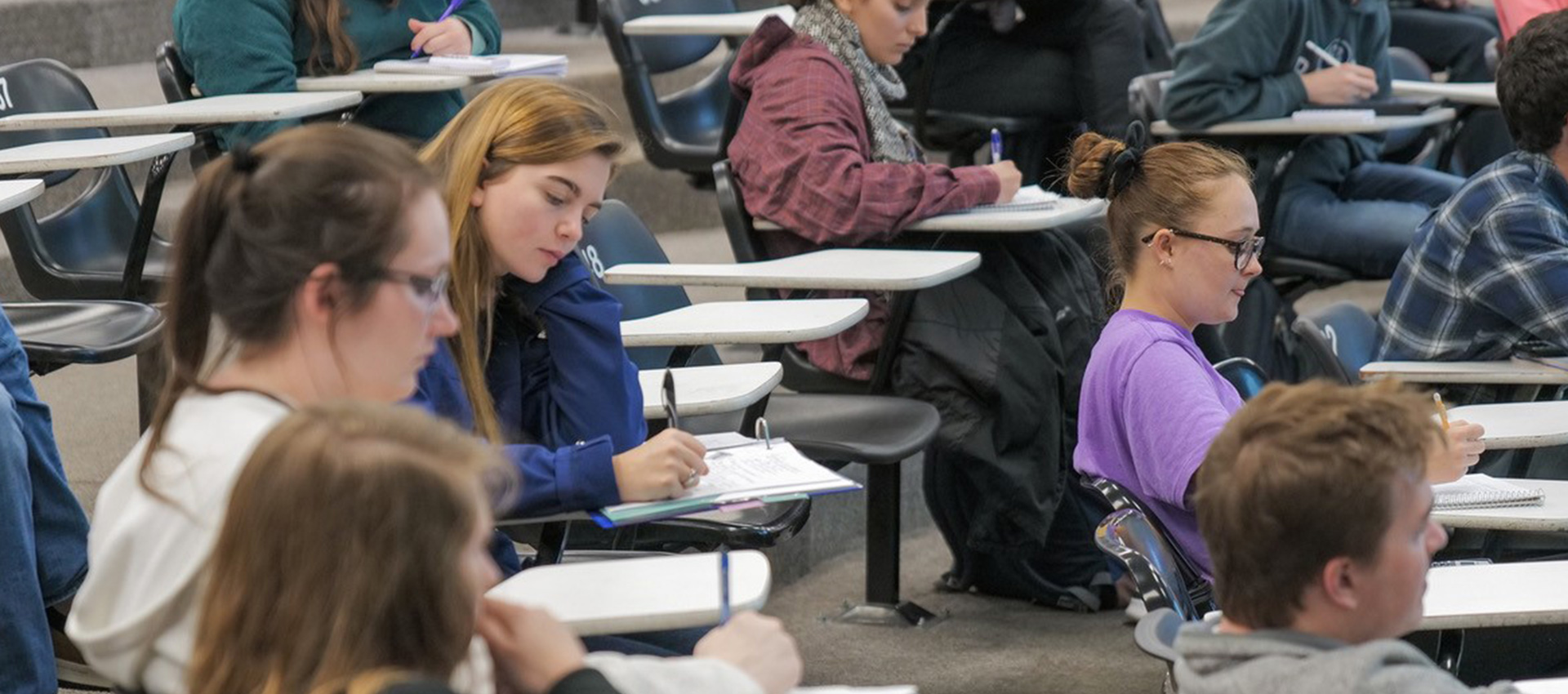
GOAL 5: STRATEGIC ENROLLMENT
PRIORITY INITIATIVES
Undertake several initiatives over the next five years to achieve and maintain a robust and diverse enrollment of students at the undergraduate and graduate levels.
-
Improve the diversity of majors, minors and certificate offerings in order to appeal to a wide-variety of students.
-
Develop a targeted recruiting plan to increase the enrollment of students from groups that are traditionally underrepresented in STEM.
Work to create new relevant and marketable majors, minors and certificates that appeal to the increasingly diverse career goals of students. In conjunction with departments, work to create new major offerings that play to the strength of the current faculty as well as help shape the strategic hiring plan for future faculty members. Major initiatives to be explored include:
-
Work with departments to develop new majors, minors and certificates that will appeal to students interested in medical and professional school.
-
Implement interdisciplinary majors, minors and certificates that span all COSAM departments.
-
Identify new major electives in order to create a less rigid degree plan and expand interest among students.
-
Make changes to existing curricula to reduce the time to earn a degree.
Increase the number of interdisciplinary graduate degrees, dual degrees, collaborative programs, and certificates in strategic areas (e.g., biophysics, computational and data science, biomedical/health, environmental) aligned with major university initiatives. These new graduate programs will offer new options (including online opportunities) for students interested in conducting research across various disciplines, thus offering an excellent opportunity to grow graduate enrollment. Major initiatives to be explored include:
-
Facilitate development of transformative and interdisciplinary degrees by providing support (release time, seed grants and summer funding) for faculty to design and implement new curricula and programs.
-
Work with upper administration to remove obstacles and streamline processes for student admission and support.
-
Hire new faculty for interdisciplinary positions or joint appointments.
-
Implement an array of interdisciplinary courses, seminars, conferences, and workshops to promote student research and learning.
-
Identify new partners (e.g., the Edward Via College of Osteopathic Medicine) to offer dual degrees and collaborative programs.
Work with the VP of Admissions to cultivate an active, targeted recruiting plan which expands the diversity of the pool of potential students from all groups including factors such as URM, first-generation, geographical area and socioeconomic status. Work to identify and form mutually beneficial relationships with high schools in the state to actively recruit qualified, diverse students from groups traditionally underrepresented in STEM. Major initiatives include:
-
Identify and form mutually beneficial relationships with high schools that have students from groups traditionally underrepresented in STEM who have the academic requirements for admission, but are not currently attending Auburn University.
-
Work to form pipeline programs in conjunction with COSAM’s Office of Outreach to attract students from groups traditionally underrepresented in STEM.
-
Increase the numbers and size of designated scholarships for students from diverse groups (including micro-scholarships for college prep events).
-
Increase collaboration with Enrollment Management to share data and coordinate recruiting events.
-
Implement scheduling software to improve students’ on-campus visits.
-
Implement new recruiting tools, update brochures, and create videos and advertising in order to better market overlooked majors.
Recruit a highly competitive and diverse graduate student body and provide support to ensure the success of underrepresented student groups. These students will be recruited via targeted efforts related to research experiences for undergraduate programs, site visits, and conference attendance. Major initiatives to be explored include:
-
Develop prestigious graduate research assistantships for college-wide competition.
-
Support infrastructure and encouraging faculty participation in continuing REU programs within the college.
-
Develop a departmental and college-wide recruitment visit program.
-
Enhance COSAM’s presence at undergraduate research conferences.
-
Support faculty visits and connections to HBCUs and other minority serving institutions.
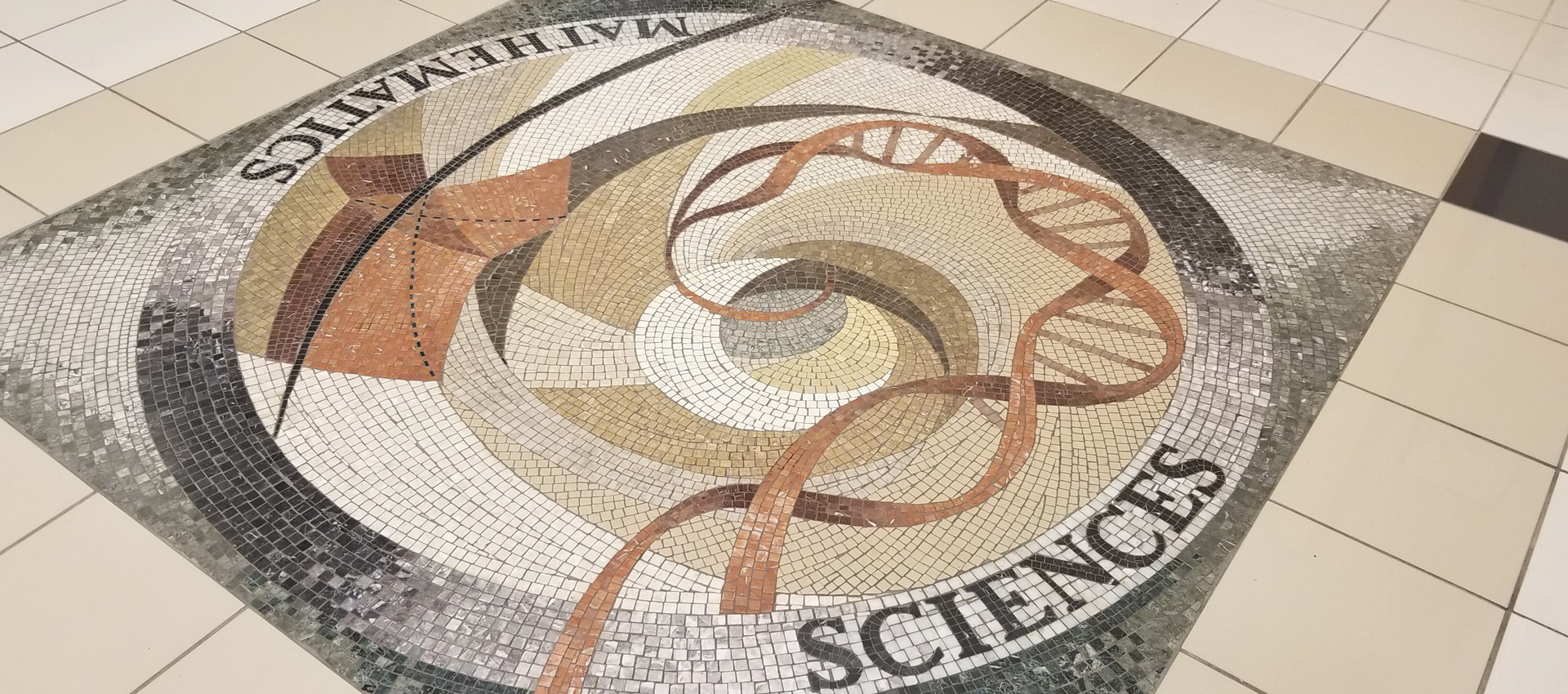
GOAL 6: OPERATIONAL EXCELLENCE
COSAM is committed to the expectation that all of its faculty, staff and students should provide and receive respect, courtesy and professionalism in all exchanges and interactions amongst themselves, other university personnel and the general public during the course of accomplishing the Auburn University research, teaching and service missions.
PRIORITY INITIATIVES
-
COSAM considers operational excellence to encompass aspects of day-to-day operations beyond those executed by the Auburn University faculty as part of the core research, teaching and service missions of Auburn University over the course of the calendar year. This includes but is not limited to advising in teaching and support in research, finance and human resources, facilities, and outreach to the local, national and international communities.
-
COSAM supports Auburn University by facilitating its research, teaching and service missions to all constituents both inside and outside (i.e., Alabama, U.S., international) the university setting. To further this, COSAM will expand efforts to communicate its mission, both within the college as well as across the central units, and to increase transparency and efficiency in general. This will be done by fostering an atmosphere of team-work and engagement within COSAM at all levels, from students to administration and beyond to the general public. It is envisioned that increasing engagement levels will result in greater operational efficiency. Successful execution of the strategy is expected to result in positive long-term changes in the organizational culture. Importantly, current and future development of leadership and other skills amongst individuals in the college is viewed as a must, with those whose roles support COSAM and Auburn University (i.e., faculty, staff, and students) being held accountable for their work.
-
Priority initiatives to be taken in the next five years are listed to the right and stress principles, systems, and tools that should contribute to sustainable improvements. These should be considered non-exhaustive; additions should be defined in a manner where COSAM and Auburn University benefit upon completion of the specific enhancement effort to increase efficiency and effectiveness.
-
Implement programs to develop leadership/ supervisory skills of COSAM supervisors and other personnel with interest in potential administrative responsibilities. Potential initiatives include: programs led by external facilitators; professional development opportunities for staff either on campus or off campus; travel awards for staff to develop such skills for both quality-of-life benefit as well as COSAM and Auburn University.
-
Assess all staff positions to determine whether current roles in COSAM best address needs of college as well as identify skills and talents to improve effectiveness and efficiency.
-
Utilize venues such as electronic media to increase transparency by informing staff of “inner workings” of the college.
-
Educate supervisors on effective management that sets clear employee expectations and addresses performance in timely fashion with consistent enforcement to create a high-performance work culture within COSAM.
-
Increase the collaborations of the COSAM Development Office with the departments and faculty to connect with alumni and friends of the college.
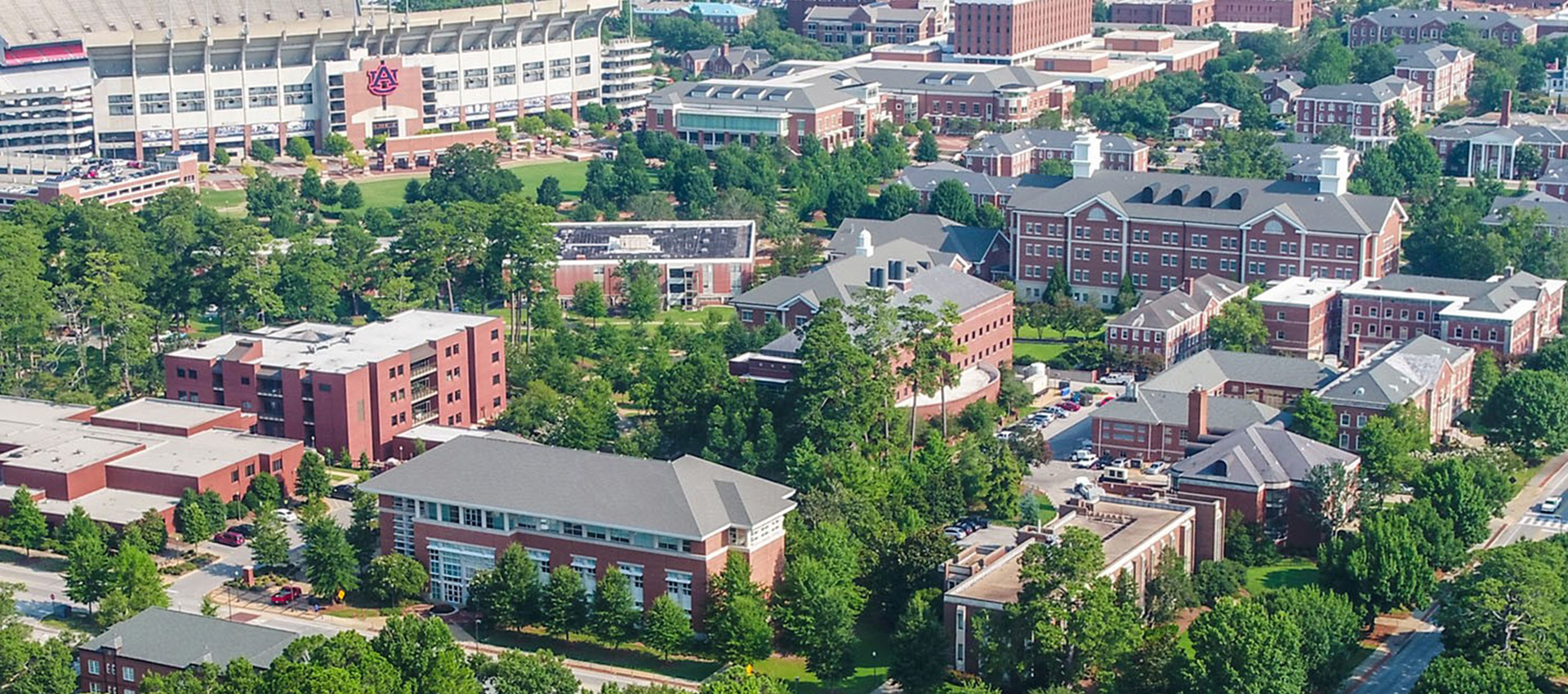
GOAL 7: TELLING THE COSAM STORY
Telling the COSAM story is essential. The college must continue to find new channels to share the IMPACT of its dedicated faculty and staff.
PRIORITY INITIATIVES
Develop COSAM branding.
-
Implement consistent branding standards to ensure each office and department strengthens and reinforces the visual identity of the college.
-
Create branding standards guidelines and templates for faculty and staff to reference.
-
Redesign website presence.
-
Design new material that reflects the branding standards of the college.
-
Expand the COSAM IMPACTS campaign.
-
Showcase major research accomplishments through the campaign.
-
Profile researchers using the campaign during each fall and spring semester.
-
Disseminate articles through COSAM’s communication channels and track engagement on social media.
-
Track internal and external media coverage.
-
Increase reach of digital platforms.
-
Extend the reach by utilizing photos and multimedia to increase value of pages and add content to increase search engine optimization.
-
Highlight unique and rewarding student experiences at COSAM such as students conducting research inside labs or interactive learning experiences in classrooms.
Showcase faculty, staff, students and alumni.
-
Highlight COSAM’s faculty, students, staff and alumni.
-
Expand coverage of staff recognition awards with in-depth coverage.
-
Promote faculty through the #COSAMFacultyFocus feature and track engagement.
-
Promote staff through the #COSAMStaffSpotlight feature and track engagement.
-
Increase profiles of alumni spotlights.
-
Add value through podcasts.
-
Enrichen marketing materials for prospective students.
-
Develop new recruitment materials for all five departments including both undergraduate and graduate programs, plus the pre-health program.
-
Set up opportunities to take engaging photos that reflects the diversity in COSAM.
